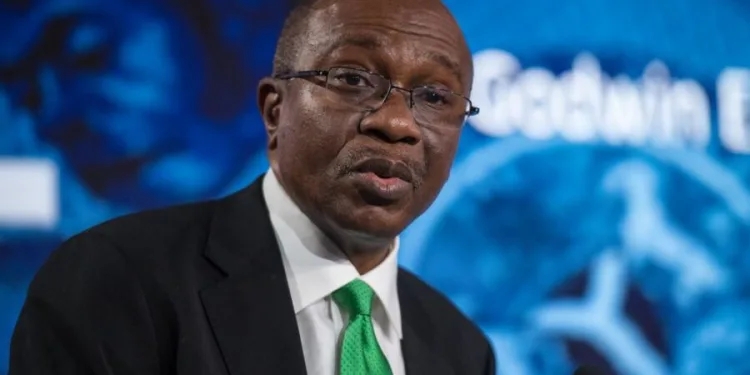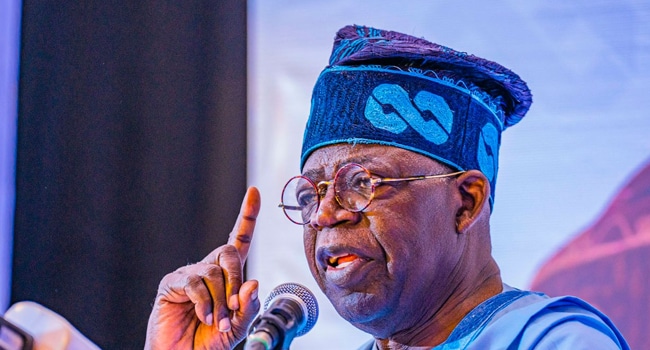Key highlights:
- New notes became necessary because currency management in Nigeria faced several challenges.
- Traditional rulers urged to enlighten residents on the use and implementation of the cashless policy of the Central Bank of Nigeria (CBN).
- CBN says it encourages the public to explore other payment channels, such as e-Naira, POS, electronic transfer, internet, and mobile banking.
The Central Bank of Nigeria through the Bankers’ Committee revealed that the introduction of new notes was important in dealing with challenges faced by Nigeria’s currency management.
The Committee also urged traditional rulers to enlighten residents on the use and implementation of the cashless policy of the Central Bank of Nigeria (CBN).
This was disclosed by the Chairman of the committee in Kano, Alhaji Muhammad Hamisu, on Tuesday in a meeting with the visit to the Emir of Kano, Alhaji Aminu Bayero.
Cashless Policy
The Bankers’ Committee Chief, Alhaji Muhammad Hamisu said Traditional rulers must educate their subjects on the benefits of going cashless for the economy.
Hamisu, who is also a Deputy Director in the CBN, said the new notes became necessary because currency management in Nigeria faced several challenges that had continued to grow adding that flyers and pamphlets were being distributed to aid sensitization on the cashless policy to enable the people to embrace online transactions, he said:
- “We are here to pay homage to you and then continue with other places and markets to sensitize them”
- “We believe that this exercise will help in increasing financial inclusion, moving towards a more cashless economy, and ensuring greater formalization of Nigerian.
- “We encourage the public to explore other payment channels, such as e-Naira, POS, electronic transfer, internet, and mobile banking.
Traditional rulers
Bayero the Emir pledged support to the sensitization programme and appealed to the apex bank to increase cash circulation, adding that CBN needs to expand its outreach in rural communities on the cashless policy for the benefit of the underprivileged persons, he said:
- “Whatever policy we want to introduce must take a gradual process. As traditional rulers that is our concern. You should keep on sensitizing the people on the cashless policy.”
He also urged Telecommunication Companies and other service providers to upgrade their networks to ease the suffering of Nigerians.
Backstory
Nairametrics reported earlier that CBN confirmed the evacuation of banknotes from its vaults to banks,
The CBN also directed all banks to open operations on Saturdays and Sundays to meet their customer demand, citing that the Governor, Godwin Emefiele would personally monitor compliance with the directive.






















Embrace cashless policy, In this unplanned system.🤷
CBN should make sure the online stuffs work well, before advocating for a cashless policy. And the masses education about this policy is Paramount.
Common traders in rural areas, whose first language is not English might not be able to use the e Naira except extra funding is provided for training assistants to help with urgent trading transactions. How far would the traditional rulers control individual businesses? Might it be the case that policy to tackle relentless armed robberies in underfunded communities has completely frustrated the Banks securing their local
Vaults against potential attacks from within the banking operations of redistributing fresh cash into society. Inadvertently, better still the molding of synthetic polymer notes in rough vegetation markets. Meanwhile, the newly printed cash are flowing with distinction in sweaty palms. There should be community security support to transform rural communities into modern market, otherwise this policy of forced digital restrictions are seem by outsiders as discrimination and marginalization of villagers. There are extremely poor communities in Nigeria and I feel they cash injection to boost local economy.
CBN and commercial Banks need to wake up quickly and do their job to protect their customers. if they want Nigerians to fully embrace cashless transaction.
A situation where POS declined payment and customers account is debited and it takes months to rectify by Banks, excessive charges on usage of mobile app and POS should be look into, failed transfer should be corrected without delay, criminal stealing people’s money online need to be swiftly apprehended and prosecuted, so also insiders within Banks that are helping thieves to steal customers money. Banks cannot claim ignorant of stolen customers money, money transfered illegally is traceable Banks should do the needful to protect their customers.
Until all these are attended to, many Nigerians are not keen on using cashless.
The CBN is forcing people into a cashless policy that is barely supported by the right infrastructure. To make matters worse, the policy is not backed by legislation according to the Supreme Court, and it’s no secret that it’s a money drive venture for the federal government that has maxed out other revenue generation avenues through criminal mismanagement. So now we work and they chop through all manners of taxes. The amount of taxation levied on financial transactions in Nigeria is criminally unbearable and should be reviewed if the cashless policy is to work. Nigeria is such a sad place to live in.
This is already a failed policy based on CBN’s, Commercial Bank’s, and other channels’ performances in the 3 months seen so far. Typical wickedly enforced policy brought about for the purpose of taxation from lousy lazy civil servants that leave the substance to chase the shadows. To them it must always be the citizenry suffering for their corruption in governance. This is why for them to stop illegal importation of rice, they must close borders. For them to stop across border illegal petroleum business, they must close borders or increase petroleum products prices locally to make it unattractive to export illegally. You ask yourself, what work is being done by the Customs? Everyone must be involved in online transactions or else, FIRS can’t tax businesses.
It has clearly been argued that Nigeria waa already operating a highly cashless economy comparing Monies in Bank Accounts (about N73 Trn) to Monies in circulation(about N3.4 Trn). This showing that Nigeria is more cashless than many countries such as the UK and the US. So why suffer your citizens for work you should do on taxation, checkmating kidnappings and vote buying?
You want to show the international financial institutions that you are in the forefront of online money transaction by banning crypto currency in banking transactions but launching your e-Naira a CBDC which has failed to attract Nigerians. Then you implemented cashless policy to coerce people to use the e-Naira. All this failed in these 3months because you simply are not sharp enough. You needed promotional partners, and you needed to allow the banks to do crypto transactions for their customers. These would have helped the e-Naira, but No, you chose coersion.
You ran the Printing Minting Company to low capacity because of corruption, and can’t even print enough new Naira notes. Even by December 2023, you may not be able to do so because of the combination of factors already stated here.
How would a government suddenly wake up to harshly implement a policy which was implemented commenced by other governments before it but in better ways. Must they bungle everything they plan to do? The cashless policy as implemented is dead on arrival and must be stopped or suspended until all stakeholders are willing to run it effectively. What has happened so far is what one can liken to Currency Confiscation,: government showing the citizenry that their monies can be seized anytime they like. It has even woken people up to begin to prepare for such situation. Government should know that communities can develop their means of transactions in order to survive whether it’s written in the books or not. It’s survival of the fittest.
Most sellers of local essential items, such as fruits, vegetables, fish and red oil, etc, are not account owners, and cannot access their payments through POS or bank transfers, hence the need for vital banking knowledge becomes paramount. Every buyer and seller needs to possess, at least a savings account to facilitate transactions. Therefore the need for such banking education needs not be overemphasized. And this should be done before the implementation the cashless transaction, even the artisans in the villages and towns ought to be put under (vehement) consideration. Otherwise, almost all classes of the public are endangered. The apex bank should have thought about situations like this beforehand. There is an error here. There’s supposed to be an immediate revisitation on the matter, before further advancement, to prevent the public from suffering such untold hardship. This is my take under the circumstances.
We should embrace cashless policy, yet the banks are marketing customers for cash deposits. CBN has reduced the amount of cash depositors can access from the banks. You cannot eat your cake and still have it. The economy need grow for jobs to be created. Policies must drive growth.